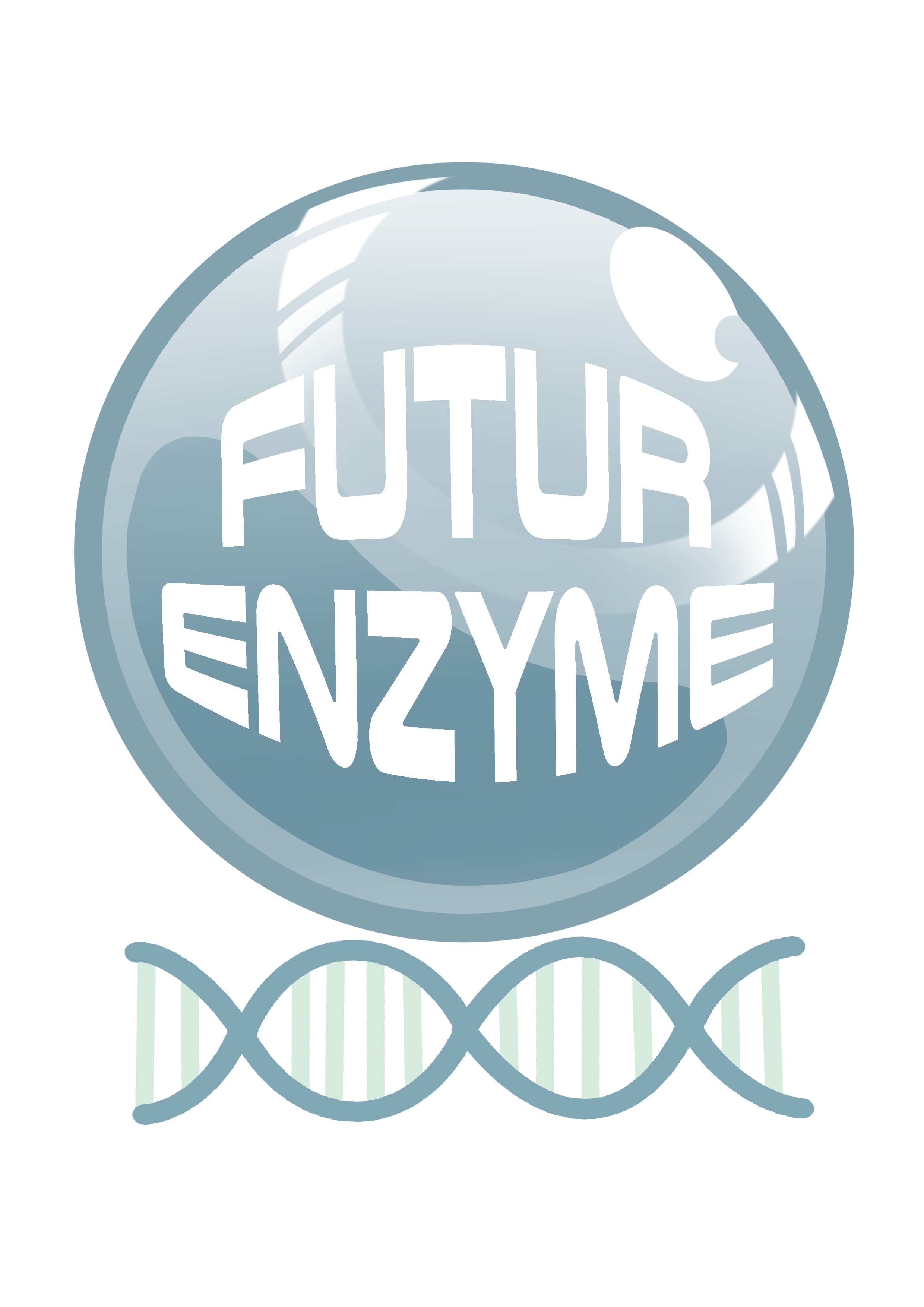Events
LAST EVENTS 2025

8th International Symposium on Novel Enzymes 2025
Budapest (Hungary) has been this year’s host of Novel Enzymes. Organized by HUN-REN Research Centre for Natural Sciencies, this symposium gathered worldwide experts on enzymes to show the scientific community the latest advances and innovations on biocatalysts. Our coordinator Prof. Manuel Ferrer (CSIC) was there talking about the developed discoverings within our Project FuturEnzyme, accompanied by Jog Raj, a member of our Advisory Board from PatentCo.

International Day of Women and Girls in Science
Every year, our Project participates in different events related to this day. We all know how women have been systematically excluded and erased, and of course in science too, from witches to the Matilda effect. Nowadays, there is a huge difference, but we still face unequal opportunities and recognition. And this needs to come to an end. If we start to show to our kids (girls, and, of course, boys!) the amazing capacity they have in theirselves, and to recognise it in others, regardless boys or girls, real equality can be reached. This is our aim for this day, in which members from CSIC and BSC have brought closer science, and FuturEnzyme, to our youngest generations.

2025

Biologic nanoparticles to fight microplastics
Is it posible to modify a pore particle enzyme in such a way that has the ability to degrade microplastics? Yes, it is! How this can be accomplished was explained by our Coordinator Manuel Ferrer (CSIC) in the prestigious Fundación Ramón Areces (Madrid, Spain), with the collaboration of SEBBM. The talk can be watched.2024

Webinar “Enzymes Magic: The Science Behind Everyday Sustainable Products”
We are constantly making decisions: What do I have for breakfast? Or, What do I wear today? And many of them imply buying products that can have different impact not only in their purpose, but also for the environment. As consumers, we need to be informed to choose more consciously. In this webinar, we learned about enzymes, present in around 10% of the products we consume, and how they improve and green them. Talks from our coordinator, Advisory Board, and industrial partners, shed light on different aspects of the matter. If you didn’t connect and are interested in helping us to undertand better the consumer choices, follow the QR on the up-right image to fill the survey, your feedback is invaluable to us!
IV JEB 2024
The Aquarium of the beautiful spanish city of San Sebastian-Donosti held the IV JEB (Spanish Congress of Biocatalysis, Jornadas Españolas de Biocatálisis). Our Project was represented by Dr. Laura Fernandez-Lopez with an oral communication. This Congress was organized by SEBiot – Sociedad Española de Biotecnología and CIC biomaGUNE, and served as a really nice place to broaden our networking and as an opportunity to learn more on the future of biocatalysis.

Machine Minds, Bio Solutions:
Redefining Bioprocess & Enzyme Engineering
Artificial intelligence (AI) and machine learning (ML) potential is far from exhausted. AI&ML are seen by many as the next big revolution in the IT sector. In this webinar organized by our partner CLIB, we have learnt how in the fields of enzyme and bioprocess engineering, many methods applying AI are already being developed and successfully implemented. Our partner BSC showed us their part in this revolution, together with 3 more experts in the field. Actually ChatGPT was used to generate the title of the webinar as an example and introduction.

ESOF2024
Our project clustered from the beginning with the other 3 projects in the same EU call. We have so much in common, and we are so much stronger together! A proof of this beneficious union is our participation in ESOF2024, under the title “Biochemistry for a greener world: how enzymes can transform the chemical industry and help create sustainable consumer products”. Accompanied by Dr. Manfred Kircher to add his expertise in bio-economy to our vision, we had a really nice intervention. We also stablished some interesting conversations with people in the audience, such as stakeholders, policy-makers, or academic. Besides, it was a really good opportunity to see each other face-to-face; some of us have known each other from long ago, others have met here for the first time. We want to thank Scienseed (RadicalZ) for their initiative to attend to this forum and the great organization. We plan to keep on working to sum up efforts, keep posted!

Jaeger’s Farewell
On 28th May 2024, the University of Düsseldorf (Heinrich-Heine-Universitaet, Forschungszentrum Jülich, Germany) organized a symposium in honor of Prof. Dr. Karl-Erich Jaeger. He is one of the essential members of FuturEnzyme’s consortium, with more than 40 years of experience in the world of microbial and enzymatic technologies. His retirement is a well deserved step, but we will miss him!
2023
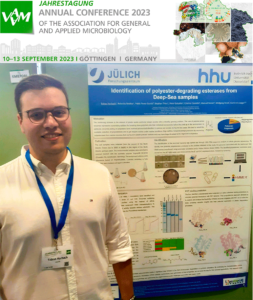 Tobias Horbach:
Tobias Horbach:
“Identification of polyester-degrading esterases from deep-sea samples”
The first in-person edition of the Annual Conference of the German Association for General and Applied Microbiology after the pandemic break took place in Goettingen, Germany. UDUS FuturEnzyme fellow Tobias Horbach used this opportunity to present his project as collaborative work of FuturEnzyme partners UDUS, UHAM, Bangor and CSIC demonstrating the power of cooperation.
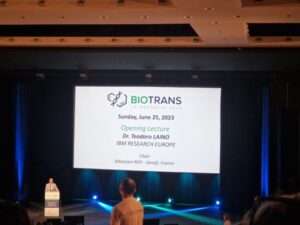 BioTrans 2023
BioTrans 2023
This week has been intense! Laura Fernández, Paula Vidal and Cristina Coscolín have assisted to BioTrans 2023 in La Rochelle (France) where they shared our work in the form of pitch talk, oral communication and poster! So productive!
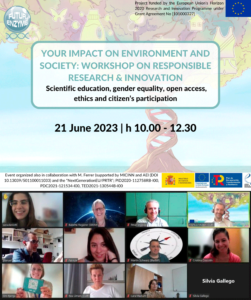 CSIC, CLIB, ITB: Your impact on environment and society: Workshop on Responsible Research & Innovation
CSIC, CLIB, ITB: Your impact on environment and society: Workshop on Responsible Research & Innovation
Responsible Research & Innovation (RRI) principles are a must in all current and future investigations. To be sure that we squeeze at the maximum our results, we have to be sure that we are working in the right direction and in line with the best practices. Key is to never lose sight of the real demanded needs for society and environment. With these priorities in mind, we set up a interactive online workshop in which to deepen in RRI and apply its principles to practical examples. Experts in the matter were involved and leading different groups, which worked together to share personal views and examples. Different aspects were covered in the frame of RRI principles. We want to thank the experts, Babette Regierer, Petar Vrgovic, Silvia Gallego and Luisa Crisigiovanni, and all the participants; we enjoyed a nice discussion, different views and experiences, and a really enriching time!
 Webinar Managing data & resources: examples in research projects
Webinar Managing data & resources: examples in research projects
How to obtain, manage and share your project’s data? How important is it to obtain/share samples according to regulations? In this internal webinar, the coordinators of different EU projects (OxiPro, RadicalZ, EnXylaScope, FuturEnzyme and Nymphe) gave a short presentation about the Data Management Plan (DMP) strategy, they type of data and metadata generated, how they manage, how the share, etc. The Nagoya protocol and the Access and Benefit Sharing (ABS) regulations is also interesting (how to manage microbes, enzymes, environmental samples), so we had a representative of the Spanish Ministry for the Ecological Transition to discuss about it. At the end, we had a discussion on how to move forward with data management.
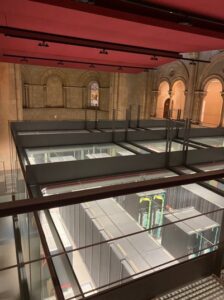 BSC: Workshop on Computational Enzyme Bioprospecting and Engineering
BSC: Workshop on Computational Enzyme Bioprospecting and Engineering
In this theoretical and hands-on course organized by FuturEnzyme and OxiPro, our members have learned how to take advantage of the potential that computational tools have in the discovery and development of disruptive enzymes. This collaborative workshop between the projects from the Cluster Enzymes for Greener Products has also provided a perfect space for meeting colleagues.
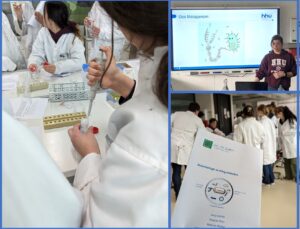 UDUS: Discover biotechnology your everyday life /An expedition to novel enzymes
UDUS: Discover biotechnology your everyday life /An expedition to novel enzymes
UDUS FuturEnzyme fellows Rebecka Molitor and Stephan Thies were invited together with their colleague Sonja Kubicki to host three days of the Easter holiday academy “Biotechnology” organized by the Science College Haus Overbach. Together with them, the high school students discovered biotech products in their everyday life, observed in lab experiments different enzymes and biosurfactants at work in their household detergents and joined in their minds a research cruise to find novel enzymes in the sediments of the North Atlantic Ocean. 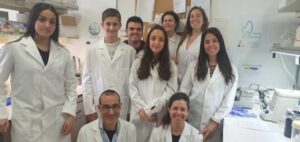 CSIC: 4ESO+company training
CSIC: 4ESO+company training
This week we had one more year at CSIC’s laboratory the visit of students within the framework of the 4ESO+company program of the Comunidad de Madrid. They have learnt all the common procedures we use in our daily work: microbe cultivation, DNA extraction, protein production, characterization and purification, PCR, enzymatic activity measurements… We hope we have helped to keep growing their scientific interest and curiosity. Thank you Enma, Pablo and Norhuane! 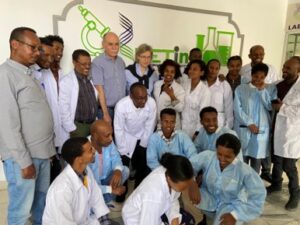 UHAM: course “Biotechnology and Phages”
UHAM: course “Biotechnology and Phages”
This week, Prof. Wolfgang Streit from our partner UHAM has been teaching in the course “Biotechnology and Phages” in the Bio and Emerging Technology Institute (BETin) in Addis Ababa, Ethiopia. The aim of this Institute, established in 2016, is to move towards bioeconomy through innovation and research. For sure all the students enjoyed the course! 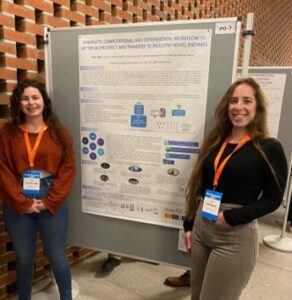 CSIC: Novel Enzymes 2023
CSIC: Novel Enzymes 2023
This year’s edition of Novel Enzymes took place is Greifswald, Germany. This city has a long university tradition, which makes it a priviledged location to meet colleagues and experts in the field of enzymes. Although getting there was a long journey and the city received our workmates Paula and Laura with snow, they enjoyed the congress and come back full of anecdotes and new ideas. 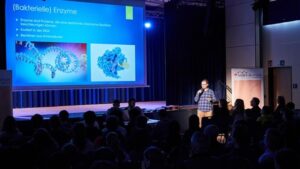 UHAM: Science Café at a MINT school
UHAM: Science Café at a MINT school
Pablo Pérez participated in this event, organized by MINT schools in Hamburg. These schools have a special offer on maths, informatics, nature sciences and technology. In this interesting initiative, Pablo showed to the students and teachers how beneficial enzymes and microorganisms are, and their potential for real life and daily use products improvement and greening. 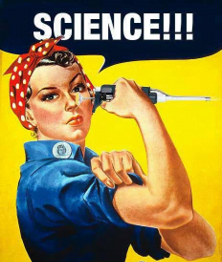 CSIC: 11F, International Day of Women and Girls in Science 2023
CSIC: 11F, International Day of Women and Girls in Science 2023
Our CSIC colleagues spent a whole day again at school, in this occasion, in the other side of the class. In the frame of 11 February, Paula, Laura, Cristina and Patricia talked to and with the 750 students from CEIP Plácido Domingo (Madrid), ranging from 3 to 12 years old, quite a chellenge! There was time also for some experiments to raise their interest and curiosity… maybe in a few years, some of them become FuturEnzymers! 2022
 Bangor «New enzymes and biomolecules from extremophiles and metagenomes»
Bangor «New enzymes and biomolecules from extremophiles and metagenomes»
This Centre for Environmental Biotechnology (CEB) Event and Workshop (in person and on line) was held at Bangor University. Professor Peter Golyshin (Bangor) opened the event, followed by Professors Michail Yakimov (CNR) and Manuel Ferrer Martínez (CSIC). At this event assisted CEB researchers, representatives from Academia, Industry and the Funder (WEFO). 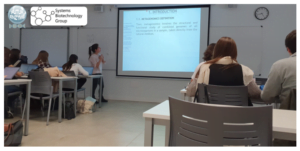 Cristina Coscolín: “Metagenomics: a useful tool for the discovery of novel enzymes with biotechnological applications”
Cristina Coscolín: “Metagenomics: a useful tool for the discovery of novel enzymes with biotechnological applications”
The Francisco de Vitoria University (Madrid) has dedicated a lesson to our awesomenzymes one more year. Lectured by our CSIC colleague Cristina Coscolín, Biotechnology students learned about metagenomics and how it triggers enzyme discovery for real implementations in biotechnology.  FuturEnzyme CLIB forum: «Fantastic enzymes: Where and how to find them»
FuturEnzyme CLIB forum: «Fantastic enzymes: Where and how to find them»
In the context of our project, we organised a webinar at which almost 200 participants assisted! It was aimed at all kind of publics: researchers, entrepreneurs, manufacturers, policy makers, funding bodies, investors, consumers… everyone who cares about a greener and more sustainable future. 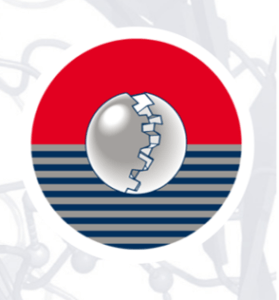 Rebecka Molitor: “Novel polyester hydrolases from marine Halopseudomnas – A comparative study of a naturally evolved variant library of PET-active biocatalysts”
Rebecka Molitor: “Novel polyester hydrolases from marine Halopseudomnas – A comparative study of a naturally evolved variant library of PET-active biocatalysts”
The 10th International Congress on Biocatalysis (Biocat), held in Hamburg (Germany), counted with our partner from HHU Düsseldorf, Rebecka Molitor, who showed her work on marine polyester hydrolases 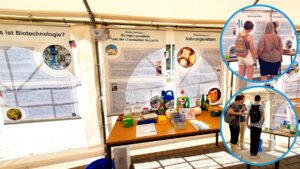 Fabienne Hilgers and Stephan Thies: Tag der Neugier (“Day of curiosity”)
Fabienne Hilgers and Stephan Thies: Tag der Neugier (“Day of curiosity”)
Forschungszentrum Jülich organised an Open Day for general public to come closer to cutting-edge research. Our colleagues Fabienne and Stephan, from UDUS, showed their work to over 600 people! 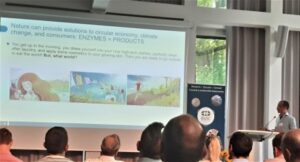 Manuel Ferrer: “Bioeconomy and climate change mitigation: new enzymes wanted”
Manuel Ferrer: “Bioeconomy and climate change mitigation: new enzymes wanted”
BioSC (Bioeconomy Science Center) Symposium, held in person in Bonn, Germany, counted within the section “High-value compounds from integrated processes” with our coordinator Manuel Ferrer, from ICP-CSIC, who talked about how we can use the best of the enzymes’ potential for greener consumer products 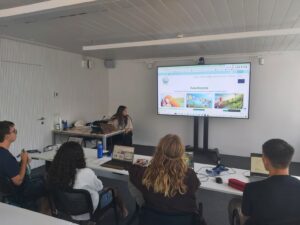 BSC: “Barcelona International Youth Science Challenge (BIYSC)”
BSC: “Barcelona International Youth Science Challenge (BIYSC)”
This two-week residential program is thought for young people (16-18 years old) from all over the world who are passionate about science and technology, annually held in Barcelona. Its goals are to inspire young scientists, to connect them with scientific leaders, and to empower them to pursue their research passions and the future challenges. In this context our BSC colleagues Ana Robles and Rubén Muñoz took in 4 students who learned how enzymes are engineered. 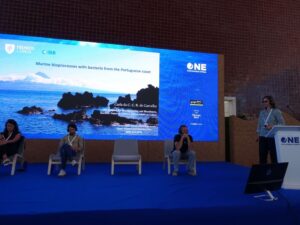 IST-ID: “Marine bioprocesses with bacteria from the Portuguese coast”
IST-ID: “Marine bioprocesses with bacteria from the Portuguese coast”
Carla CCR de Carvalho (IST-ID) presented the work entitled “Marine bioprocesses with bacteria from the Portuguese coast” at the “One Sustainable Ocean”, a side event of the United Nations Ocean conference (UNOC) held in Lisbon from June 27th to July 1st. The UN Ocean Conference, co-hosted by the Governments of Kenya and Portugal, aimed at starting a new chapter of global ocean action.  Rebecka Molitor: “Marine resources for polyester degrading enzyme”
Rebecka Molitor: “Marine resources for polyester degrading enzyme”
In this occasion, our partner Rebecka Molitor, from UDUS, participated in the Biocatalysis for the Biological Transformation of Polymer Science Conference, held in Cologne, Germany 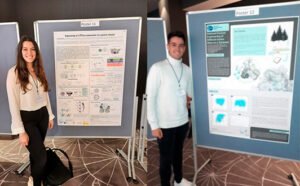 BSC: “Biocatalysis for the Biological Transformation of Polymer Science”
BSC: “Biocatalysis for the Biological Transformation of Polymer Science”
The European Federation of Biotechnology (EFB) Biocatalysis and Biobased Materials Divisions organised this conference to bring together experts from academia and industry. It took place in Cologne, Germany, and our BSC colleagues, Ana Robles and Rubén Muñoz, presented their work and our project in the poster session. 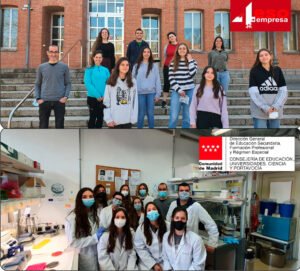 CSIC: «4ºESO+company program»
CSIC: «4ºESO+company program»
Cristina Coscolín, Laura Fernández, Paula Vidal, David Almendral, Manuel Ferrer and Patricia Molina 4ºESO+company program In the frame of the Community of Madrid program “4ºESO+company”, CSIC took in 5 students from the IES José Luis Sampedro (Tres Cantos, Madrid) to show them how the work in the lab is. They learned basic techniques that we use to discover, develop and characterise enzymes to be employed to better our lives and the environment. Natalia, Marta, Laura, Celia and Alejandra, it was such a pleasure to have you these days with us! 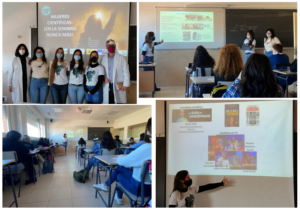 CSIC: «International Day of Women and Girls in Science»
CSIC: «International Day of Women and Girls in Science»
Cristina Coscolín, Laura Fernández, Patricia Molina and Paula Vidal, International Day of Women and Girls in Science. The International Day of Women and Girls in Science is celebrated on February 11th. Women from our partner CSIC took this great opportunity to encourage teenagers from Rafael Frühbeck de Burgos Highschool (Madrid, Spain) to reach gender equality. 2021
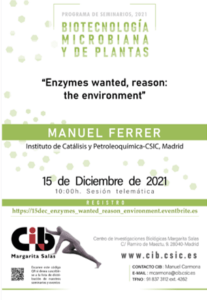 CSIC: “Enzymes wanted, reason: the environment”
CSIC: “Enzymes wanted, reason: the environment”
The CSIC’s Institute of Biological Research (CIB) organises a series of webinars under the topic Plant and Microbial Biotechnology. In this occasion, the webinar was imparted by our Coordinator Manuel Ferrer, who talked about the discovery and development of enzymes with a clear focus on lessening climate change through their real implementation in industrial processes. 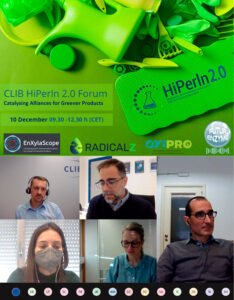 CLIB, CSIC, SCHOELLER: «Catalysing Alliances for Greener Products»
CLIB, CSIC, SCHOELLER: «Catalysing Alliances for Greener Products»
This online forum organised by CLIB within the HiPerIn 2.0 project looks at industry sectors which could benefit from a structural change away from fossil-based towards biotechnological processes based on renewable substrates. The 4 EU-funded projects conforming the Cluster Enzymes for greener products showed our potential and objectives for developing enzymes to be incorporated to real-life every-day products. We hope that the audience enjoyed our work and will be further interested in the enzyme products we will develop to help making the world green again. 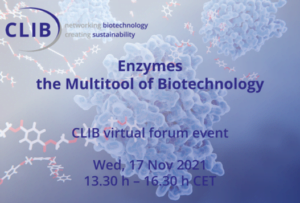 CLIB, INOFEA: “Enzymes – the Multitool of Biotechnology”
CLIB, INOFEA: “Enzymes – the Multitool of Biotechnology”
The infinite opportunities of enzymes was the topic of this CLIB forum event. INOFEA intervened to show their impressive shielding technology. More cutting-edge technologies in enzyme modification and optimisation were the central issues, together with discussion about the opportunities of this powerful multitool of biotechnology. 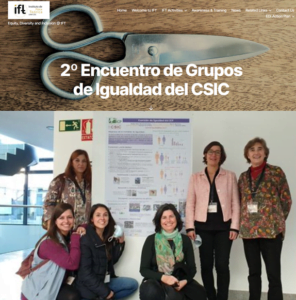 Cristina Coscolín and Patricia Molina “Equality at CSIC”
Cristina Coscolín and Patricia Molina “Equality at CSIC”
The 2nd meeting of the equality groups at CSIC was held on november. In this ocassion, a hybrid event (on-line and in person) was organised and some of us attended in person. This gave us the opportunity to talk face-to-face to experts in the area. We are in the right direction to reach equality, but there is still a long way to go! 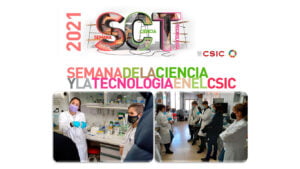 Cristina Coscolín, Laura Fernández and Patricia Molina “Science Week”.
Cristina Coscolín, Laura Fernández and Patricia Molina “Science Week”.
Our CSIC partner participated in the organization of the Science Week that took place in ICP for teenage student. This event is meant to show, in particular to young people, how science is in our everyday. In this case, they learned about daily-use products containing enzymes. 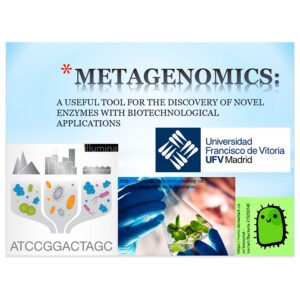 Cristina Coscolín : “Metagenomics: a useful tool for the discovery of new enzymes with biotechnological applications».
Cristina Coscolín : “Metagenomics: a useful tool for the discovery of new enzymes with biotechnological applications».
Our colleague Cristina Coscolín, from CSIC, gave an invited seminar to Biotechnology students from the Francisco de Vitoria University (Madrid), where she showed how FuturEnzyme is involved in greening the world through enzymes.
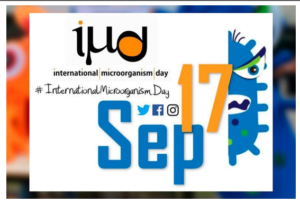 Carla C.C.R. de Carvalho “Using marine bacteria to solve human problems”
Carla C.C.R. de Carvalho “Using marine bacteria to solve human problems”
Carla de Carvalho takes part in the International Microorganism Day. Our colleague from IST-ID showed in this interesting event the importance of the microbial world in her webminar “Using marine bacteria to solve human problems”.
 Karl-Erich Jaeger: “Novel biocatalysts for biotechnology”
Karl-Erich Jaeger: “Novel biocatalysts for biotechnology”
Our partner UDUS, represented by Karl-Erich Jaeger, participated on the 3rd Aachen Protein Engineering Symposium AcES2021 (Aachen/virtual) with an Invited Lecture entitled: “Novel biocatalysts for biotechnology”.
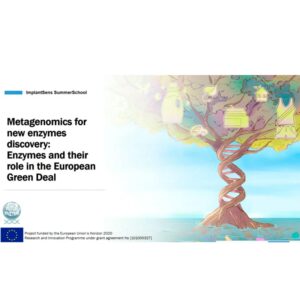 Manuel Ferrer: Metagenomics for new enzyme discovery: Enzymes and their role in the European Green deal
Manuel Ferrer: Metagenomics for new enzyme discovery: Enzymes and their role in the European Green deal
Manuel Ferrer, from CSIC-Institute of Catalysis, talks to Marie Curie PhD students in the Technical Worshop within the 2nd ImplantSens School, organized in the frame of the EU project H2020-MSCA-ITN-2018-813006 (IMPLANTSENS). It took place online on 28th of July of 2021.
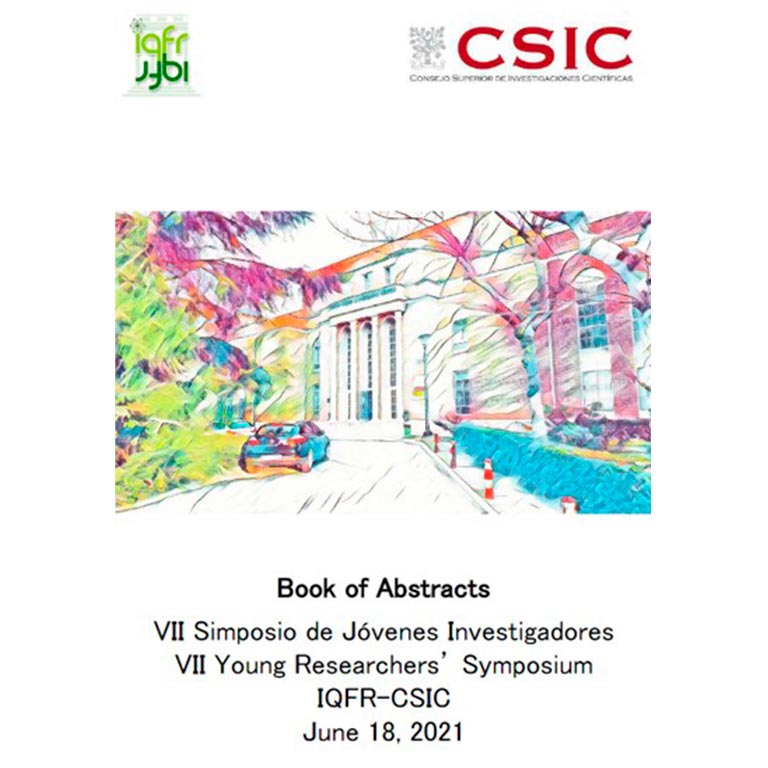 Isabel Cea: “Crystallography gives the key to confer stereospecificity to a promiscuous esterase”
Isabel Cea: “Crystallography gives the key to confer stereospecificity to a promiscuous esterase”
Isabel Cea from CSIC, participates in the VII Youg Researchers’ Symposium IQFR-CSIC with her crystallographic study of an esterase. It took place online on June 18th 2021 This act was held on-line.
 Manuel Ferrer: “Nano for the Environment”
Manuel Ferrer: “Nano for the Environment”
Qur Coordinator, Manuel Ferrer, talks to teenagers about “Nano for the Environment” (June 14th 2021, Madre de Dios school, Madrid, Spain) in the context of a Nanoscience and Nanotechnology festival. This act was held on-line.
